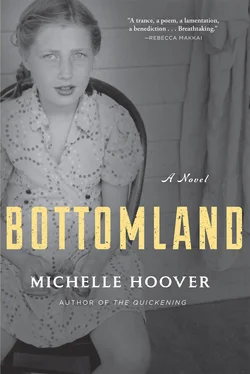It was a week later when I lost Margrit for good. The flu, said the doctor. Yet I believed it far the worse. A fever that ran on ships. Ate slices of lemon cake at our kitchen table. I might as well have fed that fever to Margrit myself. With the Harding proclamation, we never could bury her in the churchyard with a German prayer. Never so much as inscribe hier ruht in gott on a stone. I was left with not a child who dared speak my native tongue. Nor a neighbor who might welcome it. Beneath a slab of slate, we laid her in a field where she might see the house, the river behind it. The girls stood with bouquets of lilies. As the eldest, Nan was the first to throw hers in the dirt. She had the children dressed in black, their faces clean. By rights, a year they should wear the same, but in this place I imagined they would forget.
The winter became spring. Though the war had ended, Lee still had not returned. Our Agnes papered the house with drawings of her mother, all of them blurred. With the break in the weather, Nan stripped the linens from our beds. The stove was afire with boiling pots. The rooms puckered in the heat. Outside, just behind the smokehouse, my daughter starched and bleached the sheets. Shut the windows as I might, the children opened them again and leaned their faces out.
I lie now in this bed, the churchyard nearer to me, awaiting a doctor, a shovel, a hymn. The room about me is vacant. In the closet, Margrit’s dresses draw moths. How often I hear the noise of that man from the boardinghouse. The sound of him losing himself in the toilet. The sound of his shame. My children are all that is left me, strangers every one. I am in the house I built on my own acres, more than thirty years in making. The blanket across my chest is white and laundered fresh by my eldest daughter, now grown. Have I escaped nothing? Y ou are not a father , the man in the boardinghouse tells me. You are no better a man.
Do you know that the most beautiful word in my language, the word that forgives all actions and desires, becomes its opposite when mistaken for English? Bitte . The t ’s are soft and the e at the end opens in an exhale. In German the word means please , as in please forgive me . I have heard no better word for pleading. Yet in English, the word sounds closer to bitter , a sour taste. The German word asks for absolution. The English only carries blame. How can a man trust a language that turns pleading into a kind of hate?
That spring, we suffered days of rain. It melted the last of the snow. The river overflowed its banks. It wrenched hold of fence posts and sent them drifting. The work on the channel was gone, our acres a brilliant sheet of ruin. Ray tried his best, but a boy alone can only save so much. Whenever I looked out, a heavy-set woman waited by our fences. Ray spoke to her with little kindness. Still week after week, she stood until he took off his hat, wiped his hands on a trouser leg. At the end of a month, he set out earlier to his work to wait for her at the fence. When later the boy brought Patricia home as his bride, I was not the only one to believe he had raised her out of the dirt.
Outside, the sheets hung on the line. On the porch, Myrle sat alone. The girl wore little but a cotton dress, one nearly sweated through, and not a shoe on her feet. Since the death of her mother, her hair draped her forehead, a sound like a cat rising from her. I remember my parents scolding me. Keep your face dry. Cold water on the cheeks. There is sorrow. Tiefer Trauer . And the sorrow that is silent. Stille Trauer . What better than silence could I teach?
I stepped out to join her. “I have a story about your mother.”
Myrle wiped her face.
I lowered myself to the bench. I thought to rest my hand on the crown of her head, as always I had. The ashen hair of her youth never had darkened. But a man must not treat his grown daughter like a doll.
“I can tell you when first I met her. I was boarded in a house where she was the washerwoman, and your mother was always singing. The house was decrepit, but still she sang. She wore her hair in a bun, tied in a net high off her neck.” I cupped my palms behind my head to show her. Myrle gazed at my knees. “When I asked her to marry me, she stayed on the floor. I reached for her shoulders to help her to her feet, took the rag to finish the floor for her. When she saw how clean I made it, she took my chin in her hands. Ja , she said.”
Myrle scrubbed her feet against the wooden planks.
“Yes,” I said. “She answered yes. You heard me?”
My daughter nodded.
“You are the only one with the color of her hair.” I reached out to touch her, but dropped my head to my hands instead. This daughter, so alike in looks and manner to her mother.
Myrle took a strand of her hair and wrapped it about her finger. “What would have happened if Mother hadn’t been a washerwoman? If you had met at home? Would you still have left?”
The question was strange to me. I shook my head.
“I don’t know either,” she said.
Together, we sat looking out as if from the deck of a great ship. The sun had in the late afternoon fallen low and flared against the fields. Our acres were drowned. The year next, I was certain we would suffer a fine crop out of this. What a terrible burden it is to keep a child safe, to hold to her in all your weariness, lest she jump. Julius , my wife had said. A man can’t keep his children in a fist . But can you blame him for wielding hammer and nail for the few who remained? In the distance, the Elliot dogs had grown in number. The bitch must have borne a litter. They chased each other, barking the high keening of the young. Whenever the dogs started again, Myrle’s face quickened. But when at last their shadows faded, her chin fell.
“Tom Elliot told me he almost died,” she said.
“When have you and Tom been talking?”
“He told me Lee might die too.”
I gripped her arm. A cry from her. “Stay away from that boy.” When I released her, she rubbed at my fingerprints on her skin, her eyes filling. I tried to take her arm again, gently this time, but she held it close. I softened my voice. “You do not know what men want.”
“Myrle!” Esther swooped through the door and gripped her sister’s hands. I reached out to keep the girl with me, but both my daughters were off. They ran together down the steps and through the yard, their feet heavy with mud. I eyed the sky for a downpour, though the clouds appeared listless. The red of her skin stayed with me. My fingertips throbbed. My daughters could so easily be swept away by a torrent, something I never could save them from.
I thought he was dead. My brother. Lying there by the reaper with his eyes closed and his arm strung up. A line of blood down his arm and it hardly looked an arm. Dead after the reaper jerked and I’d been leading it. Dead as I carted him back to the house. The field was longer than it once’d been, the furrows hard for walking with double the weight. But weight it was and would be, even when he opened his eyes.
We’d tied the reaper behind both horses. Old Buck in front and Miss Telly behind. Buck was straight and narrow an animal as he was old, Telly small for a draft, jumpy too. “Buck will lead her just fine,” Ray said. Telly and the reaper both, he meant. Even if Buck didn’t care to be led by me.
The reaper ran on a bullwheel Father had fixed. “That old one,” he said, “it was no more than a scythe on wheels.” Mechanization , Father said, though I thought the word wrong. Mechanization was for steam. That bullwheel ran smooth, so Father left us to drive it alone. Ray was twenty and one, age-wise. I had passed all of sixteen myself. I was bigger by a head, maybe more. But alone meant Ray would ride the machine. He’d straddle the wheel and clear the cutter, while for me, I sat the horses in front as I’d always done. Father had already given Ray a wooden pole with a sharp point for the job. “Just keep them straight,” Ray told me. “I’ll do the rest.”
Читать дальше












